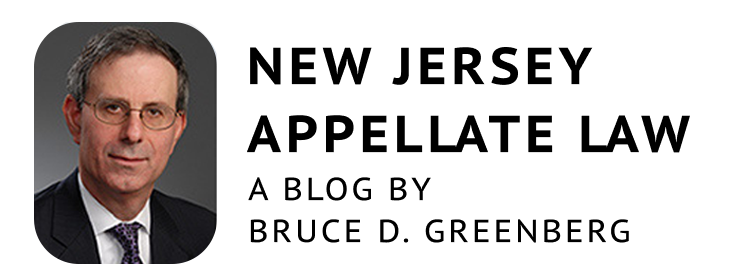Anchor Law Firm, PLLC v. State of New Jersey, ___ N.J. Super. ___ (App. Div. 2025). The Debt Adjustment and Credit Counseling Act, N.J.S.A. 17:16G-1 et seq. (“DACCA”), prohibits debt adjusters in New Jersey from operating for a profit. There is an exception for attorneys not “principally engaged” (a term not defined in the statute) in debt adjustment. That exception, adopted in a 1986 amendment, replaced a prior version of the DACCA that had exempted all attorneys from its scope.
Plaintiffs, a law firm and one of its members, filed suit to challenge the DACCA’s “principally engaged” exception. On cross-motions for summary judgment, the Law Division granted summary judgment to the State. On plaintiffs’ appeal, however, the Appellate Division reversed and invalidated the “not principally engage” exception in an opinion by Judge Sabatino that applied de novo review.
After exhaustively recounting the history of the DACCA and its predecessor statute, Judge Sabatino turned to the arguments made by plaintiffs. Among other things, “[p]laintiffs argued DACCA’s limited attorney exemption is unconstitutional because it impermissibly infringes on the Supreme Court’s ‘exclusive jurisdiction over the terms and conditions of a law license’ and, therefore, ‘violates the separation of powers clause in the New Jersey State [C]onstitution’ by regulating the type of ‘work that an attorney can do.’ Plaintiffs further asserted that DACCA violates their state and federal due process rights by being unconstitutionally vague and overbroad. They argued that the exemption is vague and ‘not defined’ and ‘[t]he enforcing agency doesn’t even know what it means . . . [or] how to measure it.’”
Judge Sabatino provided a detailed discussion of Article VI, section 2, paragraph 3 of the New Jersey Constitution, which states: “The Supreme Court shall make rules governing the administration of all courts in the State and, subject to the law, the practice and procedure in all such courts. The Supreme Court shall have jurisdiction over the admission to the practice of law and the discipline of persons admitted.”
After discussing cases such as Winberry v. Salisbury, 5 N.J. 240, 247 (1950), and many others, Judge Sabatino focused on the question of what is “the practice of law.” “Of particular relevance here, the ‘practice of law’ has been held specifically to encompass the ‘rendering of advice and assistance in obtaining extensions of credit and compromises of indebtedness.’” For that and other reasons, he concluded that “the limited attorney exemption in DACCA impermissibly encroaches upon the Judiciary's exclusive authority over the practice of law under Article VI, Section 2, Paragraph 3 of the State Constitution.”
The exception was also void for vagueness, “whether it is analyzed on its face or as applied.” The DACCA contained no definition of “principally engaged,” and the Department of Banking and Insurance (“DOBI”), which licenses non-profit debt adjusters, “has no rule, regulation, criteria, or methodology to determine when an attorney is principally engaged as a debt adjuster. It is unknown whether DACCA’s limited attorney exemption is to be measured or assessed on a daily, weekly, monthly, or annual basis. Also unknown is whether the ‘principal’ requirement is based on the number of a lawyer’s clients or cases or on the revenue received.” Moreover, “a statute is unconstitutional if it gives a public entity, such as DOBI, such broad powers that a violation of DACCA would depend on the official's ‘own subjective views as to the propriety of the conduct.’”
The panel did not reach plaintiffs’ other claims and remanded some issues for further proceedings. But the bottom line was to “reverse the trial court and grant plaintiffs’ summary judgment, declaring the limited attorney exemption in N.J.S.A. 17:16G-1(c)(2)(a) and its cross-reference to N.J.S.A. 2C:21-19(f) as violative of the Judiciary’s authority over the practice of law under Article VI, Section 2, Paragraph 3 of the State Constitution and also as void for vagueness. The exemption must be construed, as it was expressed under the pre-1986 versions of the statutory scheme, as a total exemption of all attorneys when they are lawfully practicing in this state.”
Rulings declaring statutes unconstitutional often end up at the Supreme Court. This decision thus may not be the last word on this issue.
